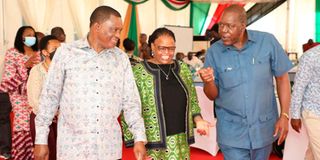Sh21.9bn budget deficit crippling services, says CJ Martha Koome

National Assembly Speaker Justin Muturi, Chief Justice Martha Koome and Kisumu West MP Olago Aluoch after a meeting at Serena Beach Resort in Mombasa on Thursday.
Chief Justice Martha Koome has decried a Sh21.9 billion budget deficit in the Judiciary.
She said the institution is facing a number of constraints, including under-staffing, which makes it harder to operate efficiently.
The CJ called for the operationalisation of the Judiciary Fund, noting that preparatory processes for electoral dispute resolution expected after the forthcoming General Election could be affected by the budgetary constraints.
The programmes include prioritised training for judges and judicial officers who handle electoral disputes and training and support for the Political Parties Dispute Tribunal.
“The understanding is that Judiciary’s resources for the 2022/23 financial year will be loaded into an operational Judiciary Fund. Overall, the Judiciary is operating at only 56 per cent of its approved staff establishment, meaning every person that is working in the Judiciary is discharging double the work that they optimally should,” she said.
She spoke in Mombasa during an engagement session with the National Assembly’s Justice and Legal Affairs Committee.
She said 90 per cent of the Judiciary’s EDR (Election Dispute Resolution) training budget is outsourced from development partners. “We have had to postpone some EDR training sessions for magistrates on account of budgetary constraints,” she said.
EDR matters
These trainings focus on technical and unique aspects of the EDR matters, scrutiny and recount, standard of proof in election petitions and intersection between election offenses and election outcomes.
“There is, therefore, a need to avail resources to train members, equip offices, develop reference material, Registry Standard Operating Procedures (SOPs) and manuals, infrastructure and human resource needs to support the electoral dispute resolution process,” she said.
In 2013, the courts resolved 189 election petitions while in 2017, the number increased to 388.
“Considering the pattern from the two previous elections and the unique nature of the current election cycle, where there is the first change-over for governors, majority of whom have served their second and final terms in office, the number of petitions is expected to rise,” said the CJ.
National Assembly Speaker Justin Muturi urged members of Parliament to look into the budget shortfall.
“Put yourself in the shoes of a litigant, where you have been declared to have lost an election, you feel that you have evidence but your petition cannot be heard and determined because there are not enough judicial officers,” he said.
Mr Muturi urged various parliamentary committees to deal with the issues raised to ensure a robust Judiciary.
The Judiciary requires more than Sh14 billion to establish a modern building to house the Supreme Court (Sh3 billion), Court of Appeal Mediation Complex (Sh1.7 billion) and a world-class Kenya Judiciary Academy (Sh10 billion).
In the FY 2021/2022, the Judiciary was allocated Sh17.1 billion, which was equivalent to 0.9 per cent of the national budget.
“The 0.9 per cent allocation is way below 2.5 per cent, the international funding standard for robust and efficient judiciaries around the world. The best practice in resourcing judiciaries around the world is that this organ of government ought to be allocated at least two per cent of the national budget. But in Kenya, our budget is 0.6 per cent to serve an economy of Sh13 trillion. This is really a tall order,” the CJ said.
Under-funding
She said the under-funding has led to an increase in the number of pending cases by three per cent, from 617,582 to 649,112, in one year.
Meanwhile, the Judiciary is set to hire 26 new judges amid the uncertainty over the judges rejected by President Kenyatta.
The CJ yesterday gazetted the vacancies for 20 High Court judges and six for the Court of Appeal after the Judicial Service Commission approved the recruitment.
Civil society group Katiba Institute, which sued the President for selectively appointing 40 judges recruited by CJ David Maraga, yesterday said though the legal dispute is ongoing, they do not intend to challenge the fresh recruitment.
“We are taking the view that these are additional judges and their hiring does not impact the other (six) judges in waiting,” said Katiba’s advocate Dudley Ochiel.
Additional reporting by Joseph Wangui.





